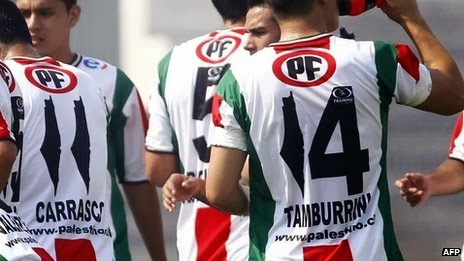The Meaning of a Soccer Jersey, by Dave Zirin
In 1920, Palestinian émigrés started a soccer club to rally around called Palestino. (The club's creation in 1920 is a rather inconvenient truth for a segment of Israeli hardliners who claim that a Palestinian identity did not exist until decades after Israel's founding.)
Over the last 94 years, Palestino has represented the Palestinian national colors, held moments of silence during periods when the Gaza Strip was being bombed and engaged in numerous charitable efforts to alleviate the suffering of refugees. It is a team that has consciously positioned themselves over the years as a symbol of historic remembrance. In line with this history, they changed the number 1 on their uniforms to look like the shape of historic Palestine and the uniting of the current Israeli and Palestinian territories.
So, their crime is that when they decided to honor the land that many of their club members and supporters had emigrated from, they didn't use the modern map of Palestine that show the land divided into zones of Israeli occupation. It doesn't show Zones A,B and C, which were declared by Israel after Israel occupied Palestine violently in an aggressive war begun by Israel. This occupation has of course been denounced as being illegal by the UN and almost all of the rest of the world. The map they used on the jerseys didn't show all the little lines that show which sections of Palestine are under control of the Israeli military, and which sections are under the control of an un-democratic Palestinian government that is supported by Israel and the US as long as it enforces Israeli "security" needs for Israel. The map they used on the jerseys didn't show the settler only roads connecting the settlements the world agrees are illegal, and it didn't show all the Israeli military checkpoints that make travel from place to place within Palestine a journey that's between slow and inconvenient and life-threateningly dangerous for a Palestinian to meet.
 |
| Chile bans Palestino football jersey -- BBC News |
This jersey has been banned because it contains an image that cannot exist. A map of a land called Palestine that was there before a bunch of foreigners came in and stole almost all that land and gave it to someone else.
I think I have a new club to cheer for. Club Deportivo Palestino. Here's to a day when they win South America and Colorado wins Concacaf and I can see a game between the two at the World Championships. Or, I'd love to see a friendly between the two someday. Except here in modern anti-freedom America, it would probably have to be a game of shirts versus skins because they'd probably get arrested and thrown into Gitmo for wearing a jersey that contains an image that the Orwellian brain police have decided that no American can ever see.
Share
